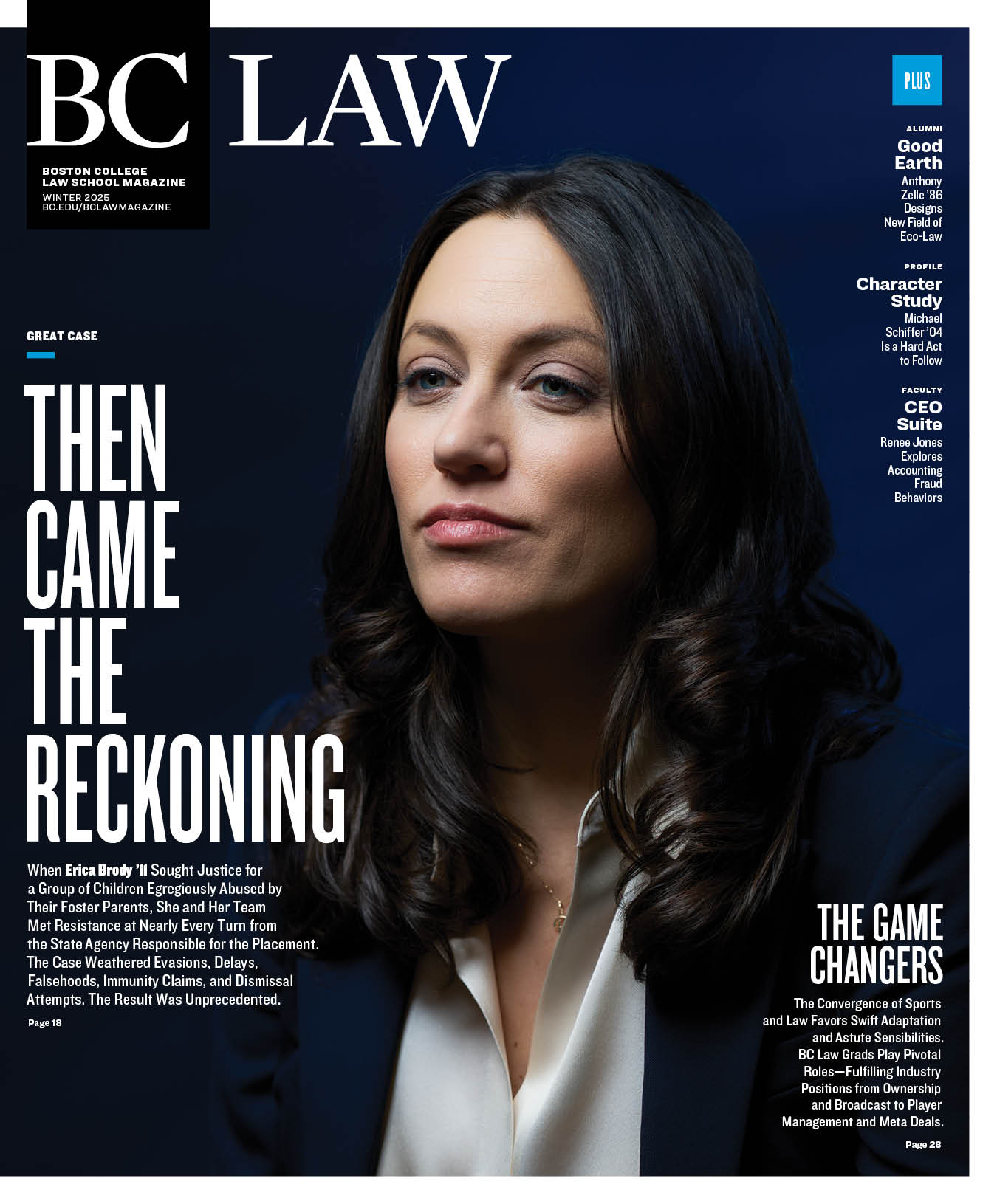Pocket Résumé
RENEE JONES
Degrees: BA, Princeton, 1986, and JD, cum laude, Harvard, 1993. Associate, Hill & Barlow, 1993-2002, practicing corporate and securities law. Media: Articles in Iowa Law Review, Washington University Law Review, University of Pennsylvania Law Review Online, and numerous others. Teaching: BC law faculty since 2002: Full professor and Dr. Thomas F. Carney Distinguished Scholar, 2014-present; Associate Dean, 2018-2021.
Idea: Incentive pay for corporate executives, in the form of stock options or bonuses tied to stock performance, is meant to align the executives’ interests with those of shareholders, but such compensation schemes often backfire by incentivizing excessive risk-taking or accounting fraud.
The Impact: In late June 2021, Gary Gensler, chair of the Securities and Exchange Commission, appointed Professor Renee Jones director of the Division of Corporation Finance, a role in which, among other duties, she would oversee the drafting of new rules governing disclosure by public companies. For two decades, Jones had built a reputation as a leading scholar in the field, publishing widely in law reviews, speaking at dozens of academic conferences, and testifying before the US House Committee on Financial Services, and other governmental bodies. “Renee brings deep expertise in corporate governance and securities law,” Gensler remarked upon her appointment. “Her leadership will be invaluable as the Division … undertakes rule modernization to meet the challenges of today.”
At the SEC, Jones headed up a team of 400 lawyers, accountants, and others. She served for two years while on leave of absence from the law school, overseeing the drafting of more than twenty proposed and final rules for the commission’s approval. Among the final rules adopted under her leadership is a rule that makes it more difficult for corporate executives to benefit from stock trades based on non-public information. Another rule requires public companies to adopt clawback policies to recover any incentive pay awarded based on erroneous accounting, whether the error resulted from fraud or human fallibility. “Having taught corporate and securities law for twenty years,” Jones says, “I was able to draw on my teaching and scholarship to help influence the shape that those rules took.”
At the SEC, Jones headed up a team of 400 lawyers, accountants, and others, overseeing the drafting of more than twenty proposed and final rules for the Securities and Exchange Commission’s approval.
One groundbreaking piece of scholarship by Jones appeared in 2017 in the Delaware Journal of Corporate Law under the title “Irrational Actors in the CEO Suite.” In it, she argues that, contrary to the prevailing view among economists, who assume that executives, being rational actors, will pursue their own long-term economic interests, incentive compensation can instead motivate irrational, and even criminal, conduct—think Enron, WorldCom, or more recently, Theranos and FTX.
Unusually for a law review article, “Irrational Actors” leans heavily on psychological research. Among the alarming findings cited in the article, corporate executives are chosen partly based on psychological traits, such as glibness, charm, and self-confidence, possessed in abundance by psychopaths. Indeed, one study found that corporate executives are four times more likely to be psychopaths than the average citizen, and another study found the incidence of traits associated with psychopathy to be at least as high in business executives as in inmates of facilities for the criminally insane. Significantly, psychopathy—according to yet another study—is highly correlated with an appetite for excessive risk. The clawbacks rule, finalized in 2022, should reduce incentives for corporate executives to engage in accounting fraud.
In addition to her work on irrationality in the corner office, Jones has published on so-called unicorns, private startup companies valued at $1 billion or more. Almost as rare as the mythical unicorn back when the term was coined—in 2013 there were only forty nationwide—they now number some 1,200, with an aggregate valuation of $4 trillion.
How to account for this astonishing growth? In the days before unicorns, startup companies typically went public during a period of rapid expansion, when they needed more money than they could raise in private markets. After a series of securities law reforms implemented in recent decades, startups can now raise huge sums in private markets and remain private indefinitely. By remaining private, unicorns avoid scrutiny from investors, regulators, and the public. This lack of oversight allows mismanagement and fraud to develop at many unicorns.
FTX provides a textbook example. The bankrupt cryptocurrency unicorn, “engaged in fraud without disclosure,” says Jones. “The shareholders, including some of the most prestigious venture capitalists and hedge funds, had no idea what was happening inside the firm.” At Theranos, another failed unicorn, the founder lied repeatedly about the performance of the company’s technology. Again, the investors remained largely in the dark. Jones has addressed problems at unicorns in a law review article, and she’s currently writing a book on the topic. Under contract with Harvard University Press, the book, titled Untamed Unicorns, is expected to be published in 2026. In the work, Jones expands on ideas from her law review piece and offers some solutions—including greater disclosure by unicorns to facilitate effective oversight.





